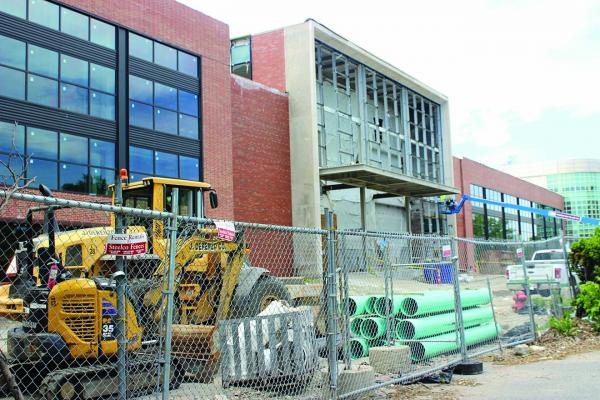June 4, 2020

Developers of The BEAT on the former Boston Globe site, are excited about getting "back to work at the proper pace."
When Gov. Baker’s four-phased reopening plan, released on May 18, allowed construction projects to resume immediately, developers with jobs in Dorchester, which had been halted in various phases earlier in the spring, moved to adapt to the new normal.
Mayor Walsh approved a plan for opening construction work at hospitals, schools, and roads on May 19, and reopened all other construction on May 27.
“What needs to be made clear is that reopening does not mean back to normal, and normal is not what we should be striving for,” the mayor said last week.
Several large-scale projects in Dorchester are aimed at bringing thousands of residential units to the neighborhood. Before the pandemic shutdown, the teams were at different stages on their construction schedules. Some were conducting community feedback sessions with the BPDA, others were filing Letters of Intent (LOI), and a few were halfway through their work.
Construction was well under way at the BEAT, the mixed-use project that will transform the former Boston Globe headquarters on Morrissey Boulevard. The building had been reduced to its bare bones, with plans to retrofit the space into a 95,000-square-foot creative office, lab, and retail space, complete with brewery and food hall.
The developers must now outline detailed safety precaution plans to be approved by the city’s Inspectional Services Department (ISD,) before they can resume construction.
“We are excited to be getting the team back to work at the proper pace,” said Todd Fremont-Smith, the senior vice-president of development and director of mixed-use projects for Nordblom Company, which owns the site.
“Working with consultants, our team has created a thorough, site-specific safety plan for ISD,” he said, “which includes an on-site medic checking workers in and out daily, temperatures scans of all personnel, and a self-certification process for workers.
“Hand washing stations have been built, and PPE is being provided. Everyone on site is working hard to keep each other safe. The building is also unoccupied and expansive, enabling workers to easily conduct business while maintaining social distancing.”
In January, Fremont-Smith had presented renderings of the work being planned to the Columbia-Savin Hill Civic Association in early January, saying the team was working toward readying the site for possible tenants to tour by late spring.
Center Court Partners, the owner of the 2.23-acre 75 Morrissey site next to the BEAT property, had filed a letter of intent with the BPDA in January, under the name Morrissey CFL Holdings, LLC.
They had floated the idea of residential towers with 24 and 21 floors, respectively, more than a year ago. The civic received a revised plan last June. Deemed “Phase 1,” it called for lowering the building heights to 17 and 15 floors, respectively.
“In the moment, our focus has been on ensuring everyone on our team stays safe as well as preparing to adapt to whatever process is put in place to continue to engage with the community and the BPDA,” said Eric Potkin, development specialist at Morrissey CFL Holding LLC.
“We don’t have a lot of insight as to what that process may look like quite yet,” he said, “but we await any guidance that will come from the city and state and are ready to adapt as necessary to ensure we can continue forward with the project while keeping all parties actively involved.”
Center Court Partners purchased the 75 Morrissey site from the auto dealer Herb Chambers in June 2017 for $14.5 million. The group also owns the Star Market parcel and the Beasley Media Group building next to No. 75.
Down the line, the developers are looking at four or five new buildings in Phases 2 and 3, accounting for 1,080 units of housing, 86,500 square feet of retail, including a 60,000-square foot market, and around 1,000 parking spaces.
This envisions the existing roadway in the middle of the Hub 25 site next to the T station extended to, and through, the new project, creating a new tree- and park-lined internal road.
The launch of the $200 million DotBlock development at Glover’s Corner was expected to take place this spring, starting with the construction of a four-building residential complex with 488 housing units at the site.
With construction on hold for the past few months, developers were still permitted to maintain their work sites.
“The Dot Block team continues to work on pre-construction activities necessary to advance the project,” said Catherine O’Neill, a representative for the developers, Samuels and Associates and Wintergold LLC.
The complex will include about 30,000 square feet of neighborhood-focused retail space and more than an acre of public space. Revised plans that were approved by the BPDA last year also include a 345-space underground garage.
The plan to redevelop the old Bayside Expo site on Columbia Point sees a mix of office space, labs, retail, along with as many as 1,450 units of housing over 3.5 million square feet, according to a letter of intent document filed on March 5 by Accordia Partners LLC.
The team that signed a 99-year lease with UMass Boston last year will manage the build-out of the 20-acre waterfront site, along with another large parcel across Mount Vernon Street now occupied by Santander Bank.
Accordia Partners filed a Letter of Intent with the BPDA after months of partnering with Dorchester civic associations in planning charrettes they called “Citizens Connect to Bayside.”
Kirk Sykes and Dick Galvin, principals at Accordia, said in a statement: “We look forward to the next steps in the review process,” which will be a document providing much more detail about the plan, including infrastructure planning.


